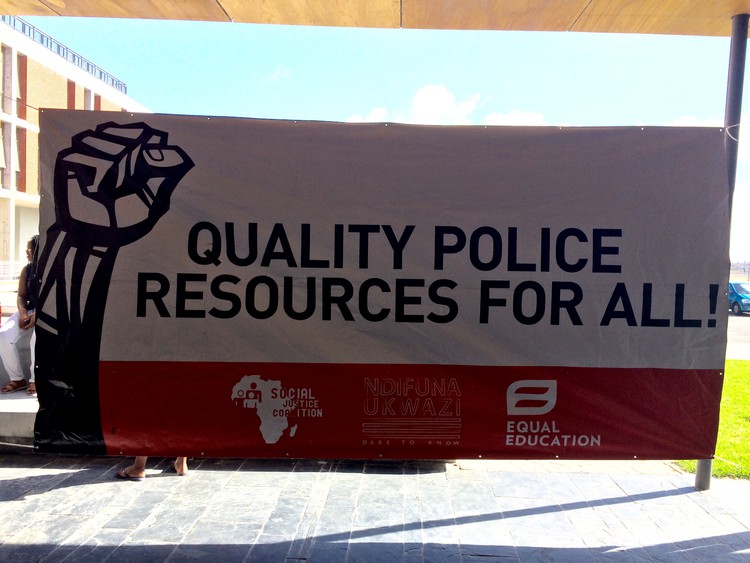Khayelitsha residents debate policing with Members of Parliament
“What is happening in Khayelitsha reflects what is happening in other black communities across South Africa”
The Social Justice Coalition held a public debate on Wednesday at the Isivivana activist centre in Khayelitsha on the allocation of police resources to police stations in townships.
The debate follows litigation the organisation initiated together with Equal Education and the Nyanga Community Policing Forum under the Promotion of Equality and Prevention of Unfair Discrimination Act. The organisations have taken the National Minister of Police, the acting National Police Commissioner, the Western Cape Police Commissioner and the Western Cape MEC of Community Safety to court. The organisations seek to have the South African Police Service (SAPS) change the way police are assigned to police stations.
In January the SJC accused the police of contempt of court after failing to file papers. SAPS was due to file papers by 30 November 2016 in terms of a court order on 5 September. SAPS has since filed on 13 March and the case will be heard in August at the Equality court.
SJC head of Safety and Justice, Chumile Sali, said the dialogue was meant to show that the problem is not only in Khayelitsha. “What is happening in Khayelitsha reflects what is happening in other black communities across South Africa,” said Sali.
Leaders from different communities including Nyanga, Masiphumelele, the Marikana informal settlement in Philippi, as well as from Mothibistad, an area 8km away from Kurumani in the Northern Cape, spoke about personal experiences in their respective communities with SAPS.
Nonkululeko Teise from Mothibistad told the audience that they have a police station that is equivalent to a four-room house, which serves 65 communities, most of which are 30 km away from the police station. “We have only 55 police and 25 detectives,” said Teise. She said that because there is a lack of space at the police station, the detectives work at a different office. “People still have to walk another 2km away from the police station to get detectives,” said Teise.
Lubabalo Vellem from Masiphumelele has been at the forefront of the fight for a police station in his community, which sparked violent protests in 2015. Vellem was arrested and charged with murder, attempted murder, assault and public violence in relation to mob justice incidents. “We still have no police station in Masiphumelele. We marched and handed in memorandums but nothing happened. It was only when people started doing things themselves that the police started showing interest in the community,” said Vellem.
Sinovuy Mpelo, 15, from Gugulethu, says she has a one hour walk to school in each direction. “I want [the police department] to give us resources so we feel safe when we’re walking to school,” Mpelo said. “We’re afraid of robbers and rapists.” Additionally, she said she feels unsafe in her own community. “Most of the time we’re home alone because our parents are at work and criminals know that,” she said.
Francois Beukman, Police Portfolio Committee Chairperson and ANC MP, along with Zakhele Mbhele, DA MP, were two speakers from Parliament invited to address the residents. Beukman urged community members in the audience to understand that of the SAPS’ R86 billion budget, 76% goes towards the salaries of police officers. The remaining budget is allocated to items such as station upkeep, vehicles, and equipment. Beukman also noted the “Back to Basics” approach SAPS is currently implementing, attempting to revamp the police department.
“We need structural and sustainable changes,” said Mbhele. “Once you address the fundamentals, you need to look at how you innovate policing.” Mbhele argued SAPS decision-making is too centralised, and that station commanders working in communities should have more power.
Community members responded to Beukman and Mbhele, noting the systematic inequalities at play. “You come and go and leave us with these crises,” said Wiseman Mpepo, activist and community member. “After 23 years of democracy, we’re still in the same position.”
“Ultimately it comes down to whether or the not the new police minister can demonstrate the political will to be responsive when he receives that kind of input, whether it comes from community members or from other MPs,” Mbhele told GroundUp. “Our task is to continue to raise those issues.”
Participants also criticised the SAPS transformation task team that was launched last August with the intention of investigating the state of the police force in communities.
Support independent journalism
Donate using Payfast

Don't miss out on the latest news
We respect your privacy, and promise we won't spam you.
© 2017 GroundUp. 
This article is licensed under a Creative Commons Attribution-NoDerivatives 4.0 International License.
You may republish this article, so long as you credit the authors and GroundUp, and do not change the text. Please include a link back to the original article.

